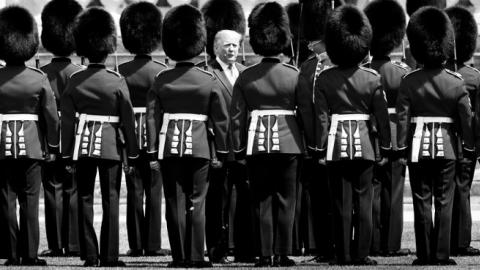On May 13 I posted a column entitled, “Why Theresa May must Go.” Now that she is actually going, and President Trump is completing his state visit to London, we have an amazing opportunity for a refresh of the U.S.-U.K. “special relationship” that dates back to before World War Two—a refresh could serve as a cornerstone of U.S. foreign and technology policy for the 21st century.
Such an historic renewal doesn’t just hinge on Parliament finally coming through on Brexit. Trump has publicly supported Britain’s departure from the EU as a springboard to closer bilateral ties with the U.K.-the failed delivery of which cost Theresa May her premiership.
But there are other issues regarding how the U.S. and the U.K. will cooperate on securing the emerging high-tech frontier for ourselves and our other allies, that Trump and his team need to broach now.
The first and foremost is reversing Britain’s commitment to let Huawei build key parts of its future 5G networks.
My May 13 article explained why giving Huawei the green light is such a strategic mistake: “The worry is that allowing the Chinese telecom equipment giant to build, supply, and maintain 5G could give Beijing backdoor access to data and networks that today are largely carried on the Internet but in the future will be on 5G—including data from government agencies and financial services, including our own.”
Key players arguing the U.S. case for banning Huawei now include Sir Richard Dearlove, who led MI6 between 1999 and 2004 and wrote recently in the preface of a report by the Henry Jackson Society on the risks of relying on Huawei for 5G technology, “We must conclude the engagement of Huawei presents a potential security risk to the U.K.” and that “I very much hope there is time for the U.K. government … to reconsider the Huawei decision.”
With May gone, there is.
Unfortunately, telecom operators in Britain–as elsewhere–could only see the low-cost advantages of letting Huawei build their networks: even though Vodafone, one of Huawei’s biggest champions, has admitted that it found major security flaws in equipment Huawei provided in the past (Vodafone insists it fixed the issues).
Theresa May’s government tried to find a compromise by allowing Huawei to build certain parts of Britain’s 5G networks, while leaving others alone. But no one was fooled by this timid expedient, which played its own part in bringing about her downfall.
There is mounting evidence that the world’s biggest telecom equipment operator isn’t just another company, but in fact behaves as an arm of Chinese military intelligence and the Chinese government (Huawei has repeatedly denied these accusations). Studies like those of the National Security Institute, the Henry Jackson Society, and the FBI’s unsealed indictment against Huawei released in January, all indicate that the company simply can’t be trusted, and certainly can’t be integrated into future 5G networks without considerable risk to users. The Trump administration’s announcement of its total ban of Huawei products in the U.S. is only acknowledgement of the weight of these allegations.
Britain is now the pivot point for other countries to acknowledge the same thing. If Britain comes around to the U.S. side, where Australia and Japan already are, this could be crucial for getting the rest of Europe to think twice about cooperating with Huawei, Brexit or no Brexit. A new prime minister such as Boris Johnson would be just the person to put Britain on the right road to the 5G future, as well as to Brexit.
On the other hand, there’s one high-tech area where the U.S. should be doing the listening, and the U.K. doing the talking. That’s on quantum technology, the Next Big Thing for the 21st century, where the U.K. has had a comprehensive national strategy going back to 2013. Under Trump the U.S. has taken major steps in that direction, but there’s still a lot we can learn from our British allies and others like Canada and Australia on how to focus resources and gain maximum leverage in this race for this crucial technology—a race we can’t afford to lose to China.
A conversation with Sir Peter Knight, Britain’s leading quantum scientist and mastermind of its quantum efforts, would be a great start for President Trump and his team.
Who knows? A joint Anglo-American strategy on quantum could give new life and purpose to the Five Eyes intelligence network that includes Canada and Australia as well as the U.K. It could even spawn a high-tech Anglosphere that would eventually include India.
On the 75th anniversary of D-Day, it's time for big visions for the U.S. and a post-Brexit Britain. Trump’s visit could be the start of a quantum leap for all of us.
NOTE: Huawei officials did not respond to my request for comments on the allegations contained in this column.
"Read in _Forbes_.
()":https://www.forbes.com/sites/arthurherman/2019/06/06/the-u-s-and-u-k-mu…

















